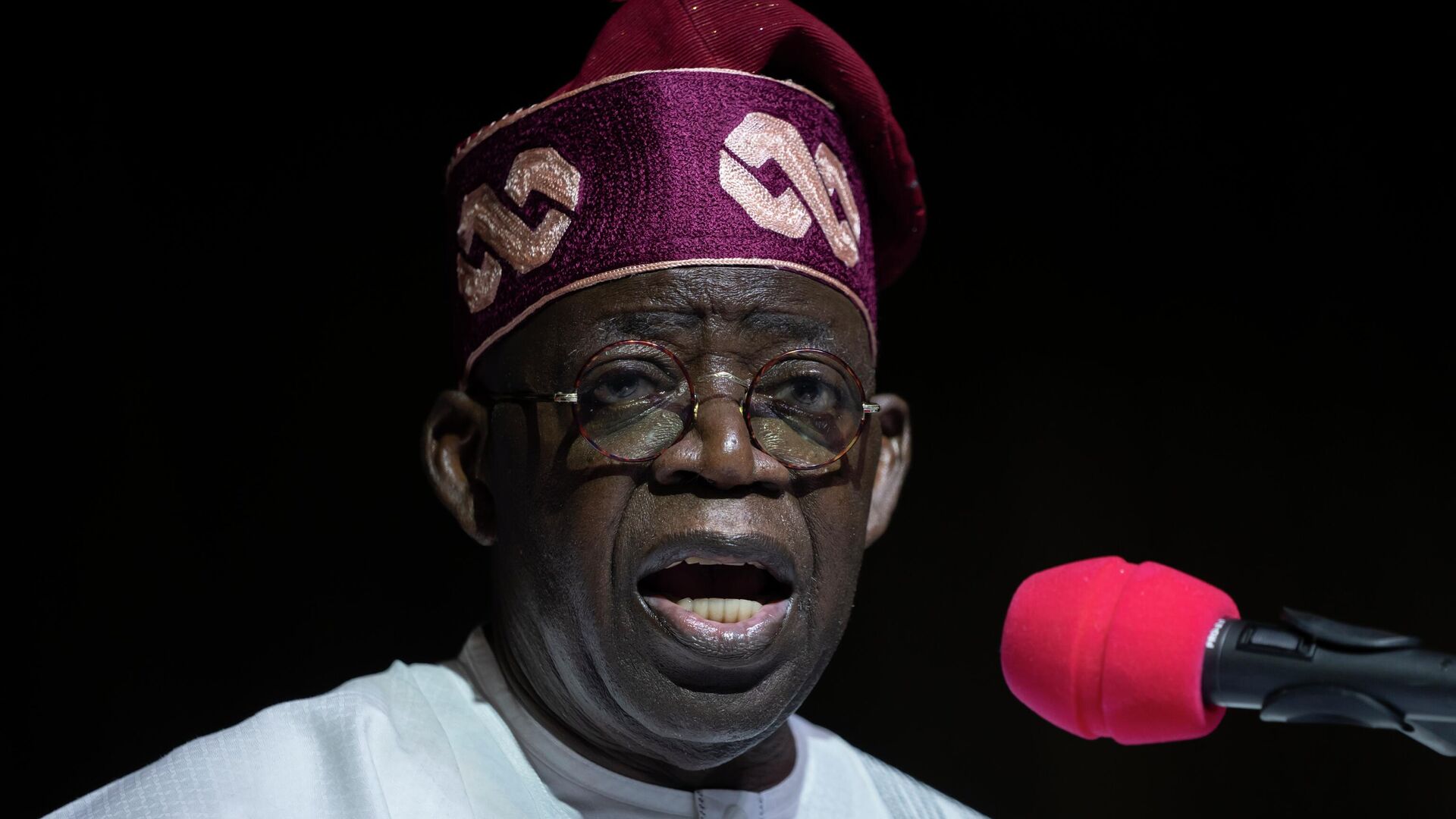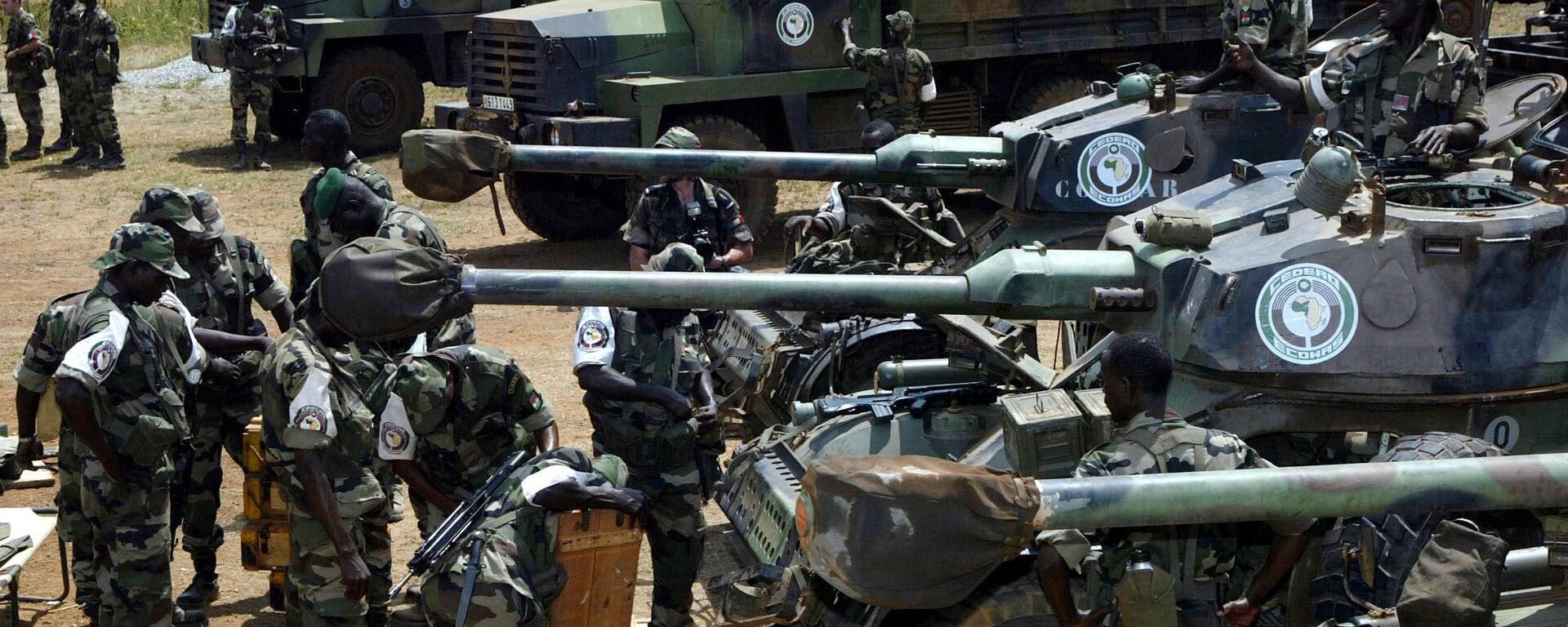https://en.sputniknews.africa/20230807/nigerias-largest-islamic-body-advises-president-tinubu-against-military-operation-in-niger-1061127800.html
Nigeria's Largest Islamic Body Advises President Tinubu Against Military Operation in Niger
Nigeria's Largest Islamic Body Advises President Tinubu Against Military Operation in Niger
Sputnik Africa
On July 26, members of Niger's Presidential Guard took over the nation after ousting President Mohamed Bazoum. The guard's commander, General Abdourahmane... 07.08.2023, Sputnik Africa
2023-08-07T13:34+0200
2023-08-07T13:34+0200
2023-08-07T13:34+0200
situation in niger after military coup
niger
west africa
nigeria
islam
bola tinubu
president
economic community of west african states (ecowas)
mohamed bazoum
https://cdn1.img.sputniknews.africa/img/07e7/08/07/1061128550_0:160:3072:1888_1920x0_80_0_0_1a1451c861ad5f9405dd2be2696b234e.jpg
Nigeria's President Bola Tinubu has been urged by Jama'atu Nasril Islam (the nation's largest Islamic organization) not to use military force against Niger, a statement released on Saturday by JNI Secretary-General Khalid Aliyu says.The military intervention may have an adverse effect on Nigeria's peace and stability, the organization's statement reads.On August 4, the Nigerian president requested that his nation send troops to the neighboring country so that Niger's president Bazoum would be reinstated, and peace would be restored.JNI responded by requesting that Tinubu give greater priority to political and diplomatic mediation as a means of ending the conflict.Utilizing force to return democracy in the neighboring country "could have unintended consequences that may impact the peace and stability of both nations," JNI stated.According to the Nigeria's Northern Senators Forum (NSF) held on August 4, sending soldiers to Niger will harm the seven northern Nigeria's states that share borders with it: Sokoto, Kebbi, Katsina, Zamfara, Jigawa, Yobe, and Borno.On August 5, Nigeria's Senate held a meeting where it rejected Tinubu's request for permission to send troops to Niger as part of an ECOWAS force to restore the constitutional order in the neighboring country, as reported by local media.The senators also suggested to the president, as well as to ECOWAS, that they would look into diplomatic solutions to the Niger problem, instead of resorting to force. On July 30, ECOWAS issued a seven-day ultimatum to the military regime in Niger in a bid to restore peace in the West African nation.According to the communique released by the group, the African leaders agreed on a number of political sanctions that would force the Nigerien military to comply.One of the sanctions presupposes "military build-up and deployment of personnel for military intervention" in order to to force the Niger's military rulers to submit in case they would not resign.
https://en.sputniknews.africa/20230806/history-of-ecowas-military-interventions-in-light-of-expiring-ultimatum-to-niger-1061107707.html
niger
west africa
nigeria
Sputnik Africa
feedback@sputniknews.com
+74956456601
MIA „Rossiya Segodnya“
2023
News
en_EN
Sputnik Africa
feedback@sputniknews.com
+74956456601
MIA „Rossiya Segodnya“
Sputnik Africa
feedback@sputniknews.com
+74956456601
MIA „Rossiya Segodnya“
niger, west africa, nigeria, islam, bola tinubu, president, economic community of west african states (ecowas), mohamed bazoum
niger, west africa, nigeria, islam, bola tinubu, president, economic community of west african states (ecowas), mohamed bazoum
Nigeria's Largest Islamic Body Advises President Tinubu Against Military Operation in Niger
On July 26, members of Niger's Presidential Guard took over the nation after ousting President Mohamed Bazoum. The guard's commander, General Abdourahmane Tchiani, proclaimed himself interim leader. On July 30, the Economic Community of West African States (ECOWAS), gave the military one week to cede power, warning force would be used otherwise.
Nigeria's President Bola Tinubu has been urged by Jama'atu Nasril Islam (the nation's largest Islamic organization) not to use military force against Niger, a statement released on Saturday by JNI Secretary-General Khalid Aliyu says.
The military intervention may have an adverse effect on Nigeria's peace and stability, the organization's statement reads.
On August 4, the Nigerian president
requested that his nation send troops to the neighboring country so that Niger's president Bazoum would be reinstated, and peace would be restored.
JNI responded by requesting that Tinubu give greater priority to political and diplomatic mediation as a means of ending the conflict.
"We acknowledge that dialogue is an invaluable tool in preventing further bloodshed and instability, within the Sahel Region, which is already beclouded with many political and security uncertainties," the organization stated.
Utilizing force to return democracy in the neighboring country "could have unintended consequences that may impact the peace and stability of both nations," JNI stated.
According to the Nigeria's Northern Senators Forum (NSF) held on August 4, sending soldiers to Niger will harm the seven northern Nigeria's states that share borders with it: Sokoto, Kebbi, Katsina, Zamfara, Jigawa, Yobe, and Borno.
On August 5, Nigeria's Senate held a meeting where it
rejected Tinubu's request for permission to send troops to Niger as part of an ECOWAS force to restore the constitutional order in the neighboring country, as reported by local media.
The senators also suggested to the president, as well as to ECOWAS, that they would look into diplomatic solutions to the Niger problem, instead of resorting to force.
"The Senate calls on the president of the Federal Republic of Nigeria as the chairman of ECOWAS to further encourage other leaders of ECOWAS to strengthen political and diplomatic options and other means with a view to resolving the political compass in Niger Republic," the Senate stated.
On July 30, ECOWAS
issued a seven-day ultimatum to the military regime in Niger in a bid to restore peace in the West African nation.
According to the communique released by the group, the African leaders agreed on a number of political sanctions that would force the Nigerien military to comply.
One of the sanctions presupposes "military build-up and deployment of personnel for military intervention" in order to to force the Niger's military rulers to submit in case they would not resign.


